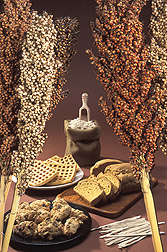This page has been archived and is being provided for reference purposes only. The page is no longer being updated, and therefore, links on the page may be invalid.
|
|
Sorghum--the Next New Wave in Grains?By Erin PeabodyJune 17, 2004 Is your breakfast cereal boring you? Or perhaps you're one of the millions of Americans who must avoid bread products that contain wheat, or the cereal proteins known as gluten. If so, sorghum might be for you. Agricultural Research Service scientists in Manhattan, Kan., are trying to coax this lesser-known grain out of its shell. Chemist Scott Bean at the ARS Grain Marketing and Production Research Center is analyzing kernels of food-grade sorghum in hopes of bringing into the mainstream new products made from the nutty-tasting grain, such as breads, waffles and noodles. Why? Some varieties of sorghum represent a surprising new source of cancer-fighting compounds. Such whole-grain varieties contain high levels of phenols and tannins, two plant compounds with a knack for mopping up cellular byproducts called free radicals that can wreak havoc on cell membranes and other delicate machinery within the human body. Sorghum brans are also high in dietary fiber. What makes sorghum attractive to many consumers, though, is not so much what it contains, but what it's missing. Because it lacks gluten--certain proteins present in wheat and two closely related cereals, rye and barley--sorghum is considered safe for the 1 to 2 million people in the United States diagnosed with celiac disease, also known as gluten intolerance. Unfortunately, according to Bean, these gluten proteins in grains, such as wheat, are what give dough made from wheat flour its desired visco-elasticity. By studying the function of sorghum proteins, Bean aims to find cultivars that will lead to a good-tasting, finely-textured sorghum bread. Bean is working with collaborators from Ireland and Germany to see which food-grade varieties produce a winning bread. In addition to investigating which sorghum varieties lend themselves to better loaves of bread, Bean and colleagues at ARS' Hard Winter Wheat Quality Laboratory in Manhattan are researching optimal recipes for baked goods, like waffles and cookies, made from the grain. The researchers also hope to create a quick and yummy breakfast food for those with gluten intolerance, especially children. ARS is the U.S. Department of Agriculture's chief scientific research agency. |

